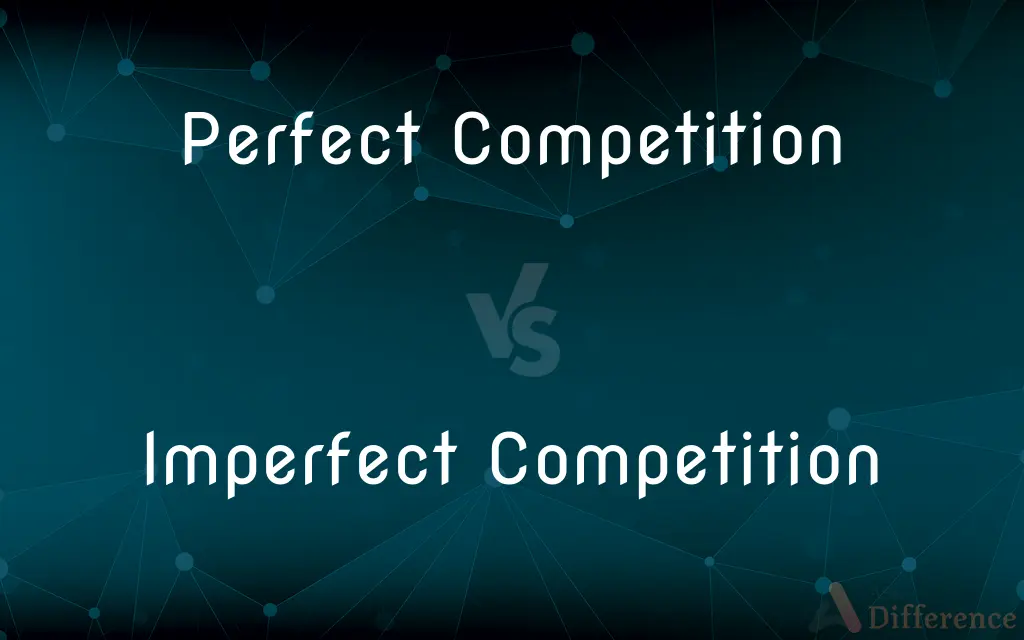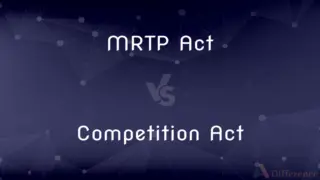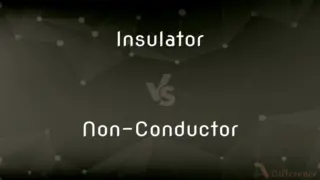Perfect Competition vs. Imperfect Competition — What's the Difference?
By Tayyaba Rehman — Published on October 12, 2023
Perfect Competition is a market structure where numerous small firms compete against each other, and products are identical, while Imperfect Competition refers to markets that do not meet all the criteria of perfect competition.

Difference Between Perfect Competition and Imperfect Competition
Table of Contents
ADVERTISEMENT
Key Differences
Perfect Competition is a theoretical market structure characterized by several unique conditions. In Perfect Competition, numerous sellers offer identical products or services, ensuring that buyers have a plethora of choices. There's no differentiation, making the price the only deciding factor for consumers. All firms in this market are price takers, meaning they accept the market price and cannot influence it.
In contrast, Imperfect Competition represents most real-world markets. In these settings, companies differentiate their products or services to varying degrees. Some might have more brand power, while others could offer unique features or benefits. As a result, sellers have some control over the price they charge. In Imperfect Competition, barriers to entry and exit might exist, preventing the market from being fully competitive.
In Perfect Competition, it is assumed that all players have perfect information about the market. This means both buyers and sellers are fully aware of prices, product quality, and other essential factors, which is rarely the case in real-world markets. On the other hand, Imperfect Competition sees limited information, leading to asymmetries and potential advantages for some players.
Moreover, Perfect Competition presupposes that there are no barriers to entry or exit. Any firm can enter or leave the market without significant costs. This contrasts starkly with Imperfect Competition, where industries might have high startup costs, strong brand identities, or other barriers that prevent new players from easily entering the fray.
In essence, while Perfect Competition is a useful theoretical concept to understand the most efficient market conditions, Imperfect Competition is more reflective of actual market conditions where companies differentiate, compete on more than just price, and don't always have perfect information.
ADVERTISEMENT
Comparison Chart
Product Differentiation
No differentiation; products are identical.
Products are differentiated in various ways.
Number of Sellers
Numerous small sellers compete.
Fewer sellers with more market control.
Price Control
Price takers; cannot influence price.
Some control over price due to differentiation.
Information Availability
Perfect information for all players.
Imperfect or asymmetric information.
Entry & Exit Barriers
No barriers to entry or exit.
Possible barriers making entry/exit harder.
Compare with Definitions
Perfect Competition
A market with identical products and many sellers
In Perfect Competition, consumers see no difference between products.
Imperfect Competition
Firms have some degree of market power
Brands in Imperfect Competition can set prices based on their product's perceived value.
Perfect Competition
Equal access to information for all
In Perfect Competition, every firm knows about market conditions.
Imperfect Competition
Market structure with differentiated products
Imperfect Competition allows companies to brand and market unique products.
Perfect Competition
No entry or exit barriers for firms
Businesses can easily join or leave Perfect Competition markets.
Imperfect Competition
Possible barriers to entry or exit
High startup costs in the tech industry are an Imperfect Competition trait.
Perfect Competition
A theoretical model for efficiency
Economists use Perfect Competition to understand ideal market conditions.
Imperfect Competition
Limited or asymmetric market information
Companies in Imperfect Competition might have proprietary information.
Perfect Competition
No single firm influences market price
Under Perfect Competition, companies take the market price as given.
Imperfect Competition
Reflects most real-world markets
Most industries, like smartphones, operate under Imperfect Competition.
Common Curiosities
How does Imperfect Competition differ from Perfect Competition in product terms?
In Imperfect Competition, products are differentiated, while in Perfect Competition, they're identical.
Can a company set higher prices in Perfect Competition?
No, firms in Perfect Competition are price takers and cannot influence prices.
Do real-world markets usually resemble Perfect or Imperfect Competition?
Most real-world markets reflect Imperfect Competition characteristics.
Why might a firm face challenges entering an Imperfect Competition market?
Barriers, like high startup costs or strong brand identities, might make entry harder in Imperfect Competition.
Why do firms in Imperfect Competition have more pricing power?
Due to product differentiation and fewer competitors, firms can set prices based on perceived value.
Are there always numerous sellers in Perfect Competition?
Yes, Perfect Competition features many small sellers competing against each other.
Can there be branding in Perfect Competition?
No, since products are identical, there's no scope for branding in Perfect Competition.
What's a key feature of Perfect Competition?
Perfect Competition has many sellers offering identical products.
What's an example of a Perfect Competition market?
Agricultural markets, like wheat, often come close to Perfect Competition conditions.
Which competition type assumes perfect information availability?
Perfect Competition assumes all players have perfect market information.
Share Your Discovery

Previous Comparison
MRTP Act vs. Competition Act
Next Comparison
Insulator vs. Non-ConductorAuthor Spotlight
Written by
Tayyaba RehmanTayyaba Rehman is a distinguished writer, currently serving as a primary contributor to askdifference.com. As a researcher in semantics and etymology, Tayyaba's passion for the complexity of languages and their distinctions has found a perfect home on the platform. Tayyaba delves into the intricacies of language, distinguishing between commonly confused words and phrases, thereby providing clarity for readers worldwide.














































